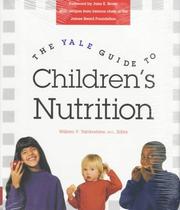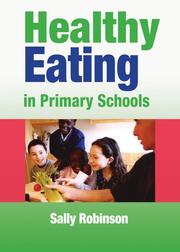| Listing 1 - 10 of 30 | << page >> |
Sort by
|
Book
ISBN: 0128117176 0128117168 9780128117170 9780128117163 Year: 2018 Publisher: London, United Kingdom : Academic Press, an imprint of Elsevier,
Abstract | Keywords | Export | Availability | Bookmark
 Loading...
Loading...Choose an application
- Reference Manager
- EndNote
- RefWorks (Direct export to RefWorks)
"Pediatric Food Preferences and Eating Behaviors reviews scientific works that investigate why children eat the way they do and whether eating behaviors are modifiable. The book begins with an introduction and historical perspective, and then delves into the development of flavor preferences, the role of repeated exposure and other types of learning, the effects of modeling eating behavior, picky eating, food neophobia, and food selectivity. Other sections discuss appetite regulation, the role of reward pathways, genetic contributions to eating behaviors, environmental influences, cognitive aspects, the development of loss of control eating, and food cognitions and nutrition knowledge. Written by leading researchers in the field, each chapter presents basic concepts and definitions, methodological issues pertaining to measurement, and the current state of scientific knowledge as well as directions for future research."--Publisher's website.
Food preferences in children. --- Children --- Nutrition. --- Child nutrition --- Pediatric nutrition --- Pediatric nutritionists --- Food
Book
ISBN: 9783030800680 Year: 2022 Publisher: Cham Springer International Publishing :Imprint: Springer
Abstract | Keywords | Export | Availability | Bookmark
 Loading...
Loading...Choose an application
- Reference Manager
- EndNote
- RefWorks (Direct export to RefWorks)
Pediatric gastroenterology --- Liver --- Children --- Diagnosis. --- Diseases. --- Nutrition. --- Child nutrition --- Pediatric nutrition --- Pediatric nutritionists --- Diagnosis --- Food
Book
Abstract | Keywords | Export | Availability | Bookmark
 Loading...
Loading...Choose an application
- Reference Manager
- EndNote
- RefWorks (Direct export to RefWorks)
Nutritionary hygiene. Diet --- Paediatrics --- Kenya --- Children --- Nutrition disorders in children --- Child nutrition --- Pediatric nutrition --- Nutrition --- Food --- Pediatric nutritionists --- Diseases
Book
ISBN: 1282121596 9786612121593 0821379755 0821379747 Year: 2009 Publisher: Washington, DC : World Bank,
Abstract | Keywords | Export | Availability | Bookmark
 Loading...
Loading...Choose an application
- Reference Manager
- EndNote
- RefWorks (Direct export to RefWorks)
This review was prepared jointly by the World Bank Group and the World Food Programme (WFP), building on the comparative advantages of both organizations. It examines the evidence base for school feeding programs with the objective of better understanding how to develop and implement effective school feeding programs in two contexts: a productive safety net, as part of the response to the social shocks of the global food, fuel and financial crises, and a fiscally sustainable investment in human capital, as part of long-term global efforts to achieve Education for All and provide social protect
School children --- Children --- Child nutrition --- Pediatric nutrition --- Food for school children --- Meals for school children --- School lunches --- Food. --- Nutrition. --- Food --- Pediatric nutritionists --- School lunchrooms, cafeterias, etc. --- Nutrition
Book
ISBN: 9783906980508 Year: 2014 Publisher: Basel, Switzerland : MDPI,
Abstract | Keywords | Export | Availability | Bookmark
 Loading...
Loading...Choose an application
- Reference Manager
- EndNote
- RefWorks (Direct export to RefWorks)
Food and nutrition has been central to human culture, philosophy and science since the beginning of civilisation. However the building blocks of food and nutrition, the nutrients, remained unknown until the late 19th century. Over the next 100 years advances in physics, chemistry and physiology led to rapid developments in our knowledge, first with development of an understanding of energy and the macronutrients,
Pediatrics. --- Children --- Infants --- Nutrition disorders in children. --- Nutrition. --- Child nutrition --- Pediatric nutrition --- Pediatric nutritionists --- Paediatrics --- Pediatric medicine --- Medicine --- Diseases --- Food --- Health and hygiene

ISBN: 0585346860 9780585346861 9780300174892 0300174896 0300069650 0300071698 9780300069655 0300069650 9780300071696 0300071698 Year: 1997 Publisher: [Place of publication not identified] Yale University Press
Abstract | Keywords | Export | Availability | Bookmark
 Loading...
Loading...Choose an application
- Reference Manager
- EndNote
- RefWorks (Direct export to RefWorks)
What is the healthiest diet for an infant? What constitutes a nutritious school lunch? How do I deal with my adolescent's eating needs and habits? Will my children receive proper nutrients if they are sick, very athletic, or vegetarians? This authoritative resource answers these and dozens of other questions, not only presenting the latest scientific knowledge about nutrition but also providing recipes from famous chefs for delicious and healthy dishes. The book, written by physicians and dietitians at the Yale University School of Medicine, an international leader in pediatric teaching, research, and clinical care, as well as by dieticians, nurses, and social workers at the Yale-New Haven Children's Hospital, is the most authoritative, comprehensive, and informative guide to childhood nutrition ever produced.The Yale Guide to Children's Nutrition includes:• information about nutritional needs at the different stages of childhood and adolescence;• advice on how to cope with a picky eater and what to feed a sick child;• special nutritional requirements for children with high cholesterol, eating disorders, allergies, diabetes, cystic fibrosis, metabolic disorders, and other conditions;• explanations of such nutritional components as calories, proteins, carbohydrates, fats, and vitamins-and examples of foods that are sources for each of them;• suggestions for healthy snacks;• ideas for eating in restaurants with children;• recipes provided by restaurants and chefs from all over the United States.
Children --- Pediatrics --- Medicine --- Health & Biological Sciences --- Child nutrition --- Pediatric nutrition --- Pediatric nutritionists --- Nutrition --- Food --- FAMILY & RELATIONSHIPS / Life Stages / Infants & Toddlers. --- Nutrition.

ISBN: 1446229513 1446212653 1281244716 9786611244712 1847878369 9781847878366 9781446212653 1412911613 9781412911610 9781446229514 9781281244710 6611244719 Year: 2006 Publisher: London Paul Chapman
Abstract | Keywords | Export | Availability | Bookmark
 Loading...
Loading...Choose an application
- Reference Manager
- EndNote
- RefWorks (Direct export to RefWorks)
Developed by Kent County Council to encourage their primary schools to promote healthy eating, this resource takes a whole-school, holistic approach towards children's eating and relates to the PSHE Curriculum and the Healthy School Standard.
Children --- School children --- Elementary school students --- Primary school students --- Pupils --- Schoolchildren --- Students --- Child nutrition --- Pediatric nutrition --- Pediatric nutritionists --- Nutrition. --- Food --- Education
Book
ISBN: 1622579828 9781622579822 9781622579815 162257981X Year: 2013 Publisher: [Hauppauge] New York
Abstract | Keywords | Export | Availability | Bookmark
 Loading...
Loading...Choose an application
- Reference Manager
- EndNote
- RefWorks (Direct export to RefWorks)
Children --- Child health --- Health of children --- Puericulture --- Pediatrics --- Child nutrition --- Pediatric nutrition --- Pediatric nutritionists --- Nutrition. --- Health and hygiene. --- Care and hygiene --- Health --- Hygiene --- Food
Book
ISBN: 9781626188754 9781626188747 1626188750 9781626188754 1626188742 Year: 2013 Publisher: New York
Abstract | Keywords | Export | Availability | Bookmark
 Loading...
Loading...Choose an application
- Reference Manager
- EndNote
- RefWorks (Direct export to RefWorks)
Obesity in children. --- Children --- Child nutrition --- Pediatric nutrition --- Pediatric nutritionists --- Childhood obesity --- Corpulence in children --- Metabolic disorders in children --- Nutrition disorders in children --- Nutrition. --- Food
Book
ISBN: 1282646060 9786612646065 008095801X 0123749271 9780123749277 9780080958019 Year: 2010 Publisher: Amsterdam : Academic,
Abstract | Keywords | Export | Availability | Bookmark
 Loading...
Loading...Choose an application
- Reference Manager
- EndNote
- RefWorks (Direct export to RefWorks)
This volume assists practicing mental health professionals in expanding their knowledge about nutritional and herbal interventions that can be attempted as alternatives to prescription medications. Designed to provide guidance for non-medical caregivers treating children and adolescents who present with emotional and/or behavioral difficulties such as such as depression, anxiety, ADHD, sleep difficulties, impulsivity, distractibility, and other psychological and psychiatric disorders, the volume provides a comprehensive discussion of naturopathic solutions based on existing research. In are
Child mental health. --- Teenagers --- Children --- Mental illness --- Mental health. --- Nutrition. --- Diet therapy. --- Alternative treatment. --- Madness --- Mental diseases --- Mental disorders --- Disabilities --- Psychology, Pathological --- Mental health --- Child nutrition --- Pediatric nutrition --- Pediatric nutritionists --- Pediatric mental health --- Child psychology --- Food
| Listing 1 - 10 of 30 | << page >> |
Sort by
|

 Search
Search Feedback
Feedback About UniCat
About UniCat  Help
Help News
News